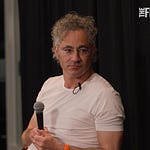We all know the horrid tale of what happened in Israel on October 7, 2023. Waves of gunmen attacked families in their homes and young people attending a music festival. The marauders filmed their murders on GoPro cameras. They burned families alive in their safe rooms; raped, and mutilated their victims; and took hostages back to Gaza on golf carts. Why did they do it?
For many critics of Israel, the horrific violence of October 7 was the predictable response to the “occupation”—never mind that Israel pulled out of Gaza in 2005. To them, October 7 was a jailbreak from what progressives often call “an open-air prison.”
But for the belligerents, in their own words, this war is for the defense of a mosque on top of a mountain. They called their massacre “Al-Aqsa Flood,” named for one of the two mosques that sit atop what is known to the Jews as the Temple Mount. This is where King Solomon’s temple once stood, and at its base is the Western Wall, where Jews have prayed since its construction in the second century BCE. It’s also known to Muslims as Haram al-Sharif, a noble sanctuary. It’s where Muslims believe the prophet Muhammad ascended to heaven in a dream. An October 10 Hamas communiqué justified their attack as resistance to thwart “schemes and dreams of Judaizing Jerusalem and Al-Aqsa.”
This reveals something very important about the Israel-Palestine conflict: That it is not a territorial dispute. It’s a holy war, with roots in an ancient city with significance far beyond its 2.5 miles of limestone walls. The world knows it as Jerusalem. The Palestinians call it Al-Quds.
Hamas claims there is a plot by Israel to destroy Al-Aqsa—the mosque atop the Temple Mount that sits in the center of Jerusalem—and build a third Jewish temple where it now stands. It’s a lie. A lie that goes back a century. The man who first began to spread the libel was from one of Jerusalem’s great families that traced its lineage back to the prophet Muhammad himself. He was a seminary-school dropout, a fanatic antisemite, and a Nazi collaborator. His name was Hajj Amin al-Husseini.
Today, Eli Lake tells the story of al-Husseini, the origins of the 100-year holy war, and why it persists to this day.
If you liked what you heard from Honestly, the best way to support us is to go to TheFP.com and become a Free Press subscriber today.
Learn more about your ad choices. Visit megaphone.fm/adchoices














Jacob Bronowski explains dogma and arrogance and ignorance the best: https://www.youtube.com/watch?v=wXwj4jMnWZg
Science, proper science, is not dogmatic and all human endeavors should follow the notion that we all stand on the edge of error. Yes Jews, yes Islam, Yes Christians, yes dogmatic scientists... we are all fallible and it is very dangerous to aspire to the knowledge of gods. Even your god.
Great stuff from Lake, as usual. But I object to one characterization.
"Palestinian nationalism" is said herein to have been born circa 1920 (and is repeatedly referred to as such). I believe it is more accurate to describe the nationalism of that era as "Arab nationalism." Even in delineating the phenomenon, Lake describes its adherents as vowing fealty to King Faisal of Syria! The "Palestinians" back then were the *Jews.* Al-Husseini's dependence on fomenting global Arab and Muslim antipathy to the Jews (centered on Al-Aqsa), to fuel this "nationalism," cements the point.
"Palestinian" nationalism as such was born in 1964, I believe, with the formation of the PLO.